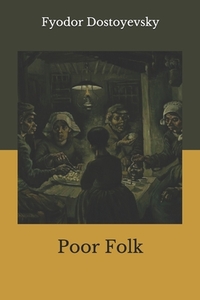You need to sign in or sign up before continuing.
Take a photo of a barcode or cover
t first glance, there would appear to be just two characters in Dostoevsky's epistolary first novel, Poor Folk, but really there are four. We have the two letter-writing doomed lovers, Barbara (Varvara) Dobroselova and Makar Devushkin, and we have the pair's mental models or emulators of one another. The story told in the letters of this pair of chastely loving neighbors, in which they live out their lives of privation and longing for one another, is thus given an almost unbearable tension as they all but scream at one another for understanding. "Ah, little angel, you are a perfect child! I know well you are weak as a blade of grass," Makar might say to the decidedly not weak Barbara, for instance, projecting quite forcefully his distorted ideal of femininity on the woman he has decided he must protect even though it is obvious from the very beginning that, sad as Barbara's straits are, she is doing a much better job of taking care of herself than Makar is.*
It's this tension, rather than the horrible living conditions described or the novel's famed status as a possible satire on Gogol's "The Overcoat" and other works, that kept me reading this**; it's the same inter-character tension that I love best about Dostoevsky in particular, and Russian novels in general, after all. There is a perverse streak in me that loves to watch characters willfully misunderstanding each other while claiming (usually dismissively) to understand each other perfectly. I say perverse because nothing makes me angrier than when this happens to me in real life. In fiction, however, it's my crack.
So, while earlier this year I decided, after having thoroughly loved the first volume of Joseph Frank's giant biography of Doestoeversky, that I needed to read Poor Folk right away, I kind of put it off, largely out of a feeling of obligation to others. I am comrades with lots of writers who released new fiction this year and whose work could benefit from what small light I could shine on it; I finally allowed some friends, new and old, to talk me into reading all the Harry Potter and all the Dark Tower novels.... the year slipped away.
But as it comes to an end, I find myself in what my good pal EssJay aptly describes as a "sneaky hate spiral" in which all fiction annoys me or otherwise fails to keep my attention. I've been here before; I know what I need, and so I keep "guaranteed good stuff" that I know I'll like against such times. Hence Poor Folk at last. AaaaaaAAAAAaaaaahhhhhhhhhhhh.
My own pecadillos notwithstanding, this book is a searingly worthwhile read even if you don't get off on the kind of tension I'm celebrating here. Doestoevsky at the kinda-faltering start of his career is better than almost anyone else at his or her peak. Listen: I hate epistolary novels. Hate them. But if all of them were like Poor Folk, I would love them. They would be my favorites.
For instance, a good chunk of Barbara's correspondence is devoted to a rather lengthy account of her childhood and upbringing, which means Dostoevsky, brand new novelist, has already set for himself the daunting task of writing convincingly in a female voice -- and a unique and specific female voice at that, for Barbara is revealed as a woman whom we would now understand as a survivor of domestic violence, both physical and emotional, whose character has been shaped/warped by terrible events that she simply understands as commonplace, as just the way the world works. Her presentation of self, not precisely from a victim mentality seeking redress but as one who subtly demands a weird blend of pity and respect for her suffering, is astonishing and uncomfortable to read, and utterly masterful. One cringes at lines like "Yet this did not arise from any WANT OF LOVE for me on the part of my father, but rather from the fact that he was incapable of putting himself in my own and my mother's place. It came from a defect of character." Isn't making excuses for one's abuser a classic sign of abuse in the modern paradigm of same? But Dostoevsky knew it and saw it from the very beginning of his career, decades before it got codified into modern social services jargon. He was that good, right from the start.
All that and a bravura depiction of the humiliations and extraordinary degree of unrewarded effort that poverty inflicts on its victims, whatever the century.
Dude. My jaw is still in my lap. And I'm thinking about opening a hot dog stand.**
*Indeed, Barbara spends a lot of the novel berating Makar for spending money on unwanted gifts for her, which he insists on doing despite her many, many protests, because as far as he is concerned, that is what men must do for women they love, and women who claim they don't want them are just being coy. This, of course, enrages Barbara further, even as it also causes her to worry because it is plain that not only can Makar not afford the bonbons and presents of cash he is constantly sending her, but that he is basically endangering his own survival to do so. Her protests just drive her to try harder to please her with gifts. And so on. It would be hilarious if it wasn't so awful. Or vice versa.
**Well, that and the "just enough" funniness, chiefly achieved in exchanges between our lovers about whether or not a writer for whom Makar serves as amanuensis is a genius (Makar's version) or a hilariously bad hack (Barbara's), complete with extensively quoted passages so ridiculously overblown that they can't even be counted as satire. When Barbara continuously declines to read more, Makar's assumption that she is simply reading them in the wrong spirit and might like them better "when you have a bonbon or two in your mouth" makes it all even funnier. If you're the type who can laugh at patriarchy and patronizing, anyway. Which I can.
***Wink again at Unca Harlan.
It's this tension, rather than the horrible living conditions described or the novel's famed status as a possible satire on Gogol's "The Overcoat" and other works, that kept me reading this**; it's the same inter-character tension that I love best about Dostoevsky in particular, and Russian novels in general, after all. There is a perverse streak in me that loves to watch characters willfully misunderstanding each other while claiming (usually dismissively) to understand each other perfectly. I say perverse because nothing makes me angrier than when this happens to me in real life. In fiction, however, it's my crack.
So, while earlier this year I decided, after having thoroughly loved the first volume of Joseph Frank's giant biography of Doestoeversky, that I needed to read Poor Folk right away, I kind of put it off, largely out of a feeling of obligation to others. I am comrades with lots of writers who released new fiction this year and whose work could benefit from what small light I could shine on it; I finally allowed some friends, new and old, to talk me into reading all the Harry Potter and all the Dark Tower novels.... the year slipped away.
But as it comes to an end, I find myself in what my good pal EssJay aptly describes as a "sneaky hate spiral" in which all fiction annoys me or otherwise fails to keep my attention. I've been here before; I know what I need, and so I keep "guaranteed good stuff" that I know I'll like against such times. Hence Poor Folk at last. AaaaaaAAAAAaaaaahhhhhhhhhhhh.
My own pecadillos notwithstanding, this book is a searingly worthwhile read even if you don't get off on the kind of tension I'm celebrating here. Doestoevsky at the kinda-faltering start of his career is better than almost anyone else at his or her peak. Listen: I hate epistolary novels. Hate them. But if all of them were like Poor Folk, I would love them. They would be my favorites.
For instance, a good chunk of Barbara's correspondence is devoted to a rather lengthy account of her childhood and upbringing, which means Dostoevsky, brand new novelist, has already set for himself the daunting task of writing convincingly in a female voice -- and a unique and specific female voice at that, for Barbara is revealed as a woman whom we would now understand as a survivor of domestic violence, both physical and emotional, whose character has been shaped/warped by terrible events that she simply understands as commonplace, as just the way the world works. Her presentation of self, not precisely from a victim mentality seeking redress but as one who subtly demands a weird blend of pity and respect for her suffering, is astonishing and uncomfortable to read, and utterly masterful. One cringes at lines like "Yet this did not arise from any WANT OF LOVE for me on the part of my father, but rather from the fact that he was incapable of putting himself in my own and my mother's place. It came from a defect of character." Isn't making excuses for one's abuser a classic sign of abuse in the modern paradigm of same? But Dostoevsky knew it and saw it from the very beginning of his career, decades before it got codified into modern social services jargon. He was that good, right from the start.
All that and a bravura depiction of the humiliations and extraordinary degree of unrewarded effort that poverty inflicts on its victims, whatever the century.
Dude. My jaw is still in my lap. And I'm thinking about opening a hot dog stand.**
*Indeed, Barbara spends a lot of the novel berating Makar for spending money on unwanted gifts for her, which he insists on doing despite her many, many protests, because as far as he is concerned, that is what men must do for women they love, and women who claim they don't want them are just being coy. This, of course, enrages Barbara further, even as it also causes her to worry because it is plain that not only can Makar not afford the bonbons and presents of cash he is constantly sending her, but that he is basically endangering his own survival to do so. Her protests just drive her to try harder to please her with gifts. And so on. It would be hilarious if it wasn't so awful. Or vice versa.
**Well, that and the "just enough" funniness, chiefly achieved in exchanges between our lovers about whether or not a writer for whom Makar serves as amanuensis is a genius (Makar's version) or a hilariously bad hack (Barbara's), complete with extensively quoted passages so ridiculously overblown that they can't even be counted as satire. When Barbara continuously declines to read more, Makar's assumption that she is simply reading them in the wrong spirit and might like them better "when you have a bonbon or two in your mouth" makes it all even funnier. If you're the type who can laugh at patriarchy and patronizing, anyway. Which I can.
***Wink again at Unca Harlan.
Plot or Character Driven:
Character
Acabei o livro faz 10 minutos e meu rosto ainda está manchado de lágrimas. Não foi só um livro comovente, como também dotado de uma profundidade psicológica impressionante. E Dosta era mais novo que eu quando escreveu! Como o título já deixa claro, essa é uma história sobre pessoas pobres - que passam fome e frio, que vivem na miséria quase absoluta e não tem certeza do que vai ser o dia seguinte. Em vários momentos, as críticas à desigualdade são diretas e até mordazes, não é para menos que este foi considerdo o primeiro romance social russo. Mas a intenção mais foda do Dosta, além de reunir o personagem do "homem sem importânicia" de Gógol e a representação dramática de Púchkin, foi dotar um homem pobre de capacidade plena de pensar e sentir, apesar de sua pobreza e humildade social, quando toda essa camada da população era sub representada como arquétipos cômicos na literatura. Dostoiévski trata da dignidade humana dos menos favorecidos, dota eles de uma profundidade emocional e sensibilidade a que é impossível passar incólume. Resumindo: que puta estreia do caralho!
challenging
dark
sad
slow-paced
Strong character development:
No
Loveable characters:
No
Diverse cast of characters:
No
Flaws of characters a main focus:
Yes
Eh, I read it right after finishing Notes From Underground, and the two just don't compare well. This piece is not as deep and doesn't resonate in the same, "every human is pathetic," way that makes Dostoyevsky so fun to read -- instead it just feels like both characters are pathetic and unsympathetic in a pretty bland way.
emotional
reflective
sad
medium-paced
Strong character development:
Yes
Loveable characters:
N/A
Diverse cast of characters:
N/A
Flaws of characters a main focus:
Yes
Full review may be found here at Silk and Chai.
I recently read Dostoevsky’s first full-length work, Poor Folk. When it was first published in 1846, it was heralded as a minor masterpiece of realist fiction, and I can certainly see why that is the case. Dostoevsky gradually reveals, in an epistolary format, the lives of two working-class residents of Saint Petersburg, two second cousins Makar Alekseevich Devushkin and Varvara Alekseevna Dobroselova. Devushkin is a government copy clerk of middle age, who lives in a wretched subdivision which he shares with some half-dozen other tenants and their families; he makes meagre wages, is constantly fretting over the threadbare state of his wardrobe, and is constantly in debt. However, he dotes upon his younger cousin Varvara, a seamstress who lives with her housekeeper in a similarly wretched situation just across the street, and writes to her often – often giving her expensive presents which he can’t afford.
This novel is really quite cleverly put together, dropping us in the middle of their correspondence and giving us these elliptical hints as to their life situations at each turn. Even at this early stage in Dostoevsky’s writing, the dark confinement of Saint Petersburg makes itself felt as an unspoken ‘third character’ in the background. The constraints and frustrations of both of the protagonists make themselves felt, at their most powerful, with a tremendous blunt force. The novel is naturalistic, but it is a naturalism markedly different in character and intent than Aksakov’s pastoral accounts of his family past. Dostoevsky hasn’t quite yet reached that point in his career where everything is ponderously meaningful, and yet even the piffle – that is the right word – the two epistolary narrators exchange with each other has the benefit of revealing to us the hard constraints they are both under. There are certainly elements of Poor Folk that remind one of Dickens, but those reminders are subtle.
One of the most moving parts of the early book is when Varvara discloses to Makar a diary that she wrote when she was younger, detailing her family’s move from the countryside into Saint Petersburg, her family’s debt woes, her father’s early death, her ‘adoption’ by her aunt Anna and her subsequent ill-fated romance with her tutor Pokrovsky. Her account of Pokrovsky’s relationship with his father – a twice-married, abused and shy man who seeks refuge in drink, but who sobers up thanks to his son’s ‘tough love’ – and her subsequent description of Pokrovsky’s illness and death, are told in a straight and matter-of-fact way, without much embellishment… and yet the emotional impact of the entire episode is remarkable. Dostoevsky may be speaking through his narrators, but they themselves only reveal to us what they choose to reveal to each other, and that clearly isn’t everything – as we can see by the end of the book. And in this way Dostoevsky skirts the ragged edge of sentimental melodrama without quite going all in...
I recently read Dostoevsky’s first full-length work, Poor Folk. When it was first published in 1846, it was heralded as a minor masterpiece of realist fiction, and I can certainly see why that is the case. Dostoevsky gradually reveals, in an epistolary format, the lives of two working-class residents of Saint Petersburg, two second cousins Makar Alekseevich Devushkin and Varvara Alekseevna Dobroselova. Devushkin is a government copy clerk of middle age, who lives in a wretched subdivision which he shares with some half-dozen other tenants and their families; he makes meagre wages, is constantly fretting over the threadbare state of his wardrobe, and is constantly in debt. However, he dotes upon his younger cousin Varvara, a seamstress who lives with her housekeeper in a similarly wretched situation just across the street, and writes to her often – often giving her expensive presents which he can’t afford.
This novel is really quite cleverly put together, dropping us in the middle of their correspondence and giving us these elliptical hints as to their life situations at each turn. Even at this early stage in Dostoevsky’s writing, the dark confinement of Saint Petersburg makes itself felt as an unspoken ‘third character’ in the background. The constraints and frustrations of both of the protagonists make themselves felt, at their most powerful, with a tremendous blunt force. The novel is naturalistic, but it is a naturalism markedly different in character and intent than Aksakov’s pastoral accounts of his family past. Dostoevsky hasn’t quite yet reached that point in his career where everything is ponderously meaningful, and yet even the piffle – that is the right word – the two epistolary narrators exchange with each other has the benefit of revealing to us the hard constraints they are both under. There are certainly elements of Poor Folk that remind one of Dickens, but those reminders are subtle.
One of the most moving parts of the early book is when Varvara discloses to Makar a diary that she wrote when she was younger, detailing her family’s move from the countryside into Saint Petersburg, her family’s debt woes, her father’s early death, her ‘adoption’ by her aunt Anna and her subsequent ill-fated romance with her tutor Pokrovsky. Her account of Pokrovsky’s relationship with his father – a twice-married, abused and shy man who seeks refuge in drink, but who sobers up thanks to his son’s ‘tough love’ – and her subsequent description of Pokrovsky’s illness and death, are told in a straight and matter-of-fact way, without much embellishment… and yet the emotional impact of the entire episode is remarkable. Dostoevsky may be speaking through his narrators, but they themselves only reveal to us what they choose to reveal to each other, and that clearly isn’t everything – as we can see by the end of the book. And in this way Dostoevsky skirts the ragged edge of sentimental melodrama without quite going all in...





